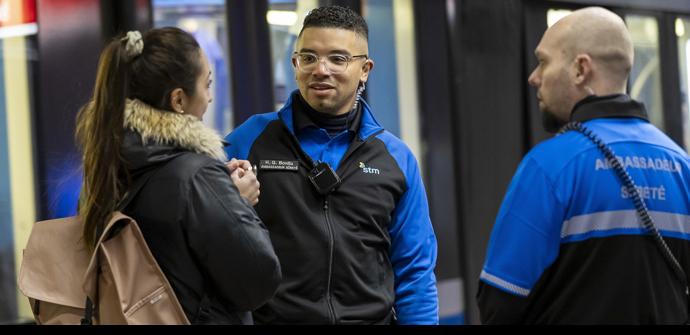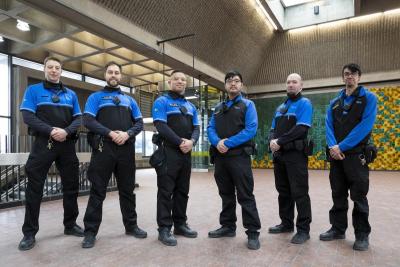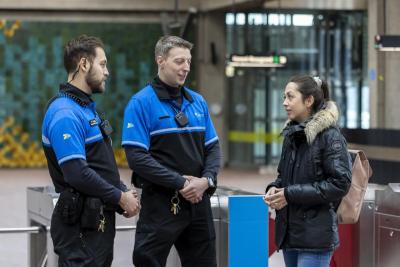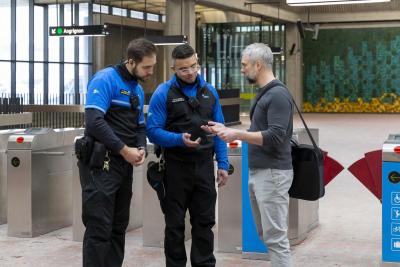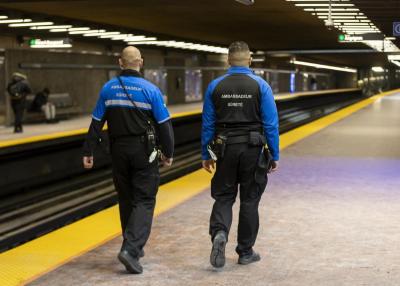The Société de transport de Montréal (STM) has announced that it has officially deployed safety ambassadors on the métro network to help maintain a sense of safety for all customers in an increasingly complex social landscape.
Drawing from similar initiatives in other major North American networks in cities such as Los Angeles, San Francisco and Philadelphia, the safety ambassadors are new field teams that provide customers with tailored guidance, support and presence during their trips.
Easily identifiable by the distinctive uniforms, the safety ambassadors are now active on the network. In groups of two, they act as a reassuring presence to customers, answering their questions, providing guidance and providing them any information they might need. Safety ambassadors are also trained to identify potentially dangerous situations and report them to the security teams.
“In the face of social issues that are becoming increasingly prevalent on our network, the STM’s strategy is to increase the visibility of staff and strengthen our ability to intervene. The creation of a new team of safety ambassadors is a first in the history of the Montréal métro, and these new, dedicated resources will meet a very specific need for our customers,” says Éric Alan Caldwell, Chair of the STM Board of Directors. “We want to ensure that everyone can get the help they need to navigate the network better and feel safer. By adding safety ambassadors to our security teams and other security measures, we believe we can effectively address this need.”
A first group of six ambassadors is already out on the network. They can be found around station turnstiles, on platforms and in métro trains. They have received 80 hours of specific training to prepare them for a variety of situations that they may be called upon to handle, including identifying safety issues, supporting major events and providing customer assistance.
New security measures in effect
Safety ambassadors are part of a series of new security measures designed to foster a greater sense of safety on the network. For instance, the STM has added 16 new special constables to the network since December 2023. And to better support people in vulnerable situations and address social coexistence issues within STM facilities, eight members of the Équipe mobile de médiation sociale (EMMIS) team now respond directly to calls from the métro control room for situations specifically related to these social issues.
How to report a situation
To assist the STM security teams in their work this winter, we would like to remind customers of the procedures for reporting situations requiring emergency intervention.
For immediate emergencies (health problems, sudden illness, persons in danger, etc.):
- Use the assistance station (red phone) located at the ends of the platforms to contact the control room
- Use the intercom in the métro car to reach the train operator
- Alert a métro station agent or a member of the maintenance staff to contact the security teams
- Alert a special constable or a safety ambassador
- Call 911 in the event of a crime
For non-emergency situations that do not require immediate intervention from our teams (solicitation, loitering, drug or alcohol consumption, etc.):
- The STM has updated its online customer contact form to report any non-emergency situation requiring an intervention. To report potential network security issues, a new “Security issues” category has been added to the drop-down menu. By selecting this option, your report will be submitted directly to the Transit Network Security investigators. This form can be found and completed on the STM website.
“Customers are some of the eyes and ears of our security teams,” says Jocelyn Latulippe, Director of Security and Fire Safety at the STM. “We need their input to respond quickly to these situations. These comments and reports allow us to tailor our security measures and improve the way we dispatch our constables and ambassadors on the network.”
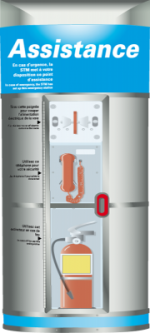
Metro station assistance station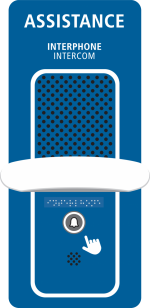
AZUR train intercom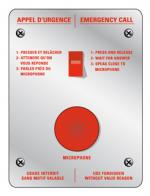
MR-73 train intercom
